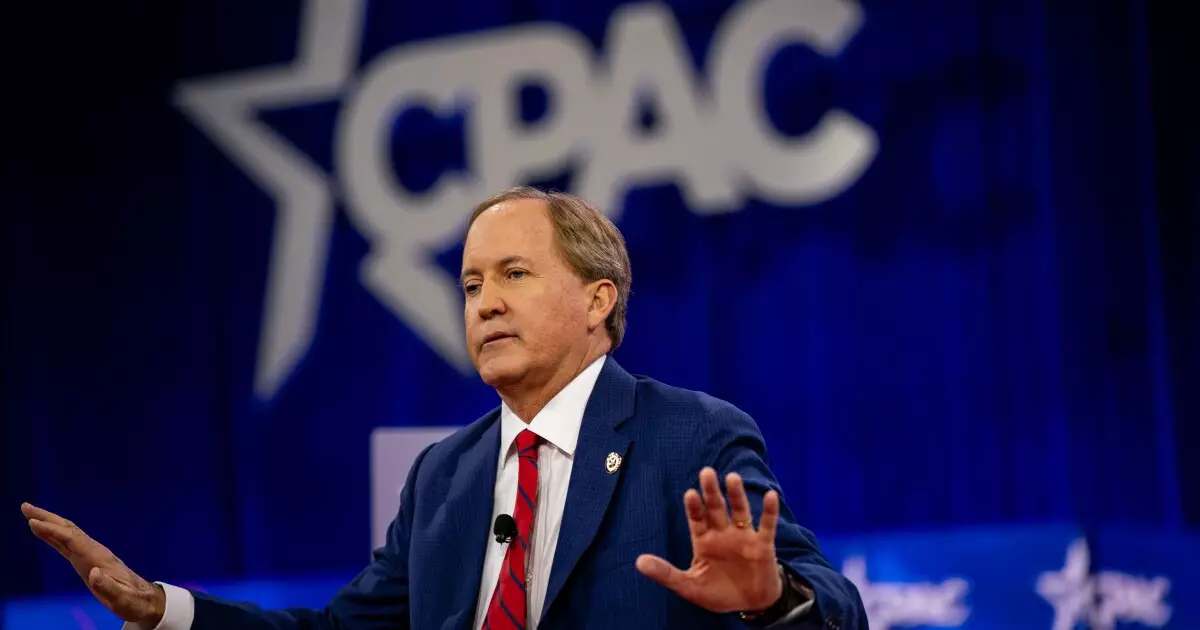In recent months, the Texas Attorney General, Ken Paxton, concluded a 14-month examination of Wells Fargo’s business practices concerning its participation in the controversial Net-Zero Banking Alliance (NZBA). This scrutiny stemmed from the Texas state law enacted in 2021, which specifically targets financial institutions that opt to boycott industries such as fossil fuels. As an integral component of this law, any entity engaged in significant government contracts (exceeding $100,000) faces potential bans on underwriting government bonds should they be found to be non-compliant with state mandates.
Paxton’s review encompassed several prominent financial institutions, including Bank of America, JP Morgan, Morgan Stanley, and RBC Capital Markets, alongside Wells Fargo. All these banks faced intense public and legal scrutiny due to their involvement with the NZBA, designed to advocate for a transition towards net-zero greenhouse emissions by the year 2050. The decision to terminate its membership in this alliance by Wells Fargo signals a critical pivot that might influence similar institutions.
The Implications of Membership Withdrawal
Wells Fargo’s withdrawal from the NZBA was not merely a legal tactic; it was framed as a progressive stance by Attorney General Paxton. In his announcement, he asserted that this decision could potentially pave the way for continued collaboration between Wells Fargo and Texas, enhancing their standing in a state that relies heavily on the oil and gas sectors. “Today, Wells Fargo took a step in the right direction by officially ending their affiliation with NZBA,” said Paxton, urging other financial institutions to reconsider their ESG policies that may influence their operations concerning Texas’s staple industries.
However, the withdrawal raises questions regarding the broader implications of these ESG-related policies within the financial sector. The need for balance between environmental responsibilities and economic impacts cannot be overstated, especially given Texas’s significant contributions to the fossil fuel market and how that impacts local economies. With Wells Fargo playing a pivotal role as a senior underwriter in major bond deals, the termination of its association with NZBA means that it will be able to continue leading substantial financing projects in the state without the looming threat of penalties related to its former commitments.
Challenges to Legislation and Institutional Responses
While the immediate reaction to Wells Fargo’s withdrawal has been portrayed as favorable, the overarching context remains uncertain. A lawsuit filed by a business coalition against the constitutionality of the Texas law adds a layer of complexity to this scenario. The legal challenge, aimed at Attorney General Paxton and Texas Comptroller Glenn Hegar, indicates a rising tension between state law and the evolving standards of corporate social responsibility.
This growing friction could potentially instigate a re-evaluation by financial institutions regarding their operational frameworks and the policies they adopt. The outcome of this litigation may set a significant precedent for how ESG factors are integrated into financial decision-making processes, especially in politically charged environments like Texas.
Furthermore, the financial landscape in Texas remains somewhat precarious. Wells Fargo had previously weathered scrutiny in August 2023 by demonstrating that it did not discriminate against any firearm entities or trade associations. This gave the bank a temporary reprieve, highlighting that while legal frameworks evolve, institutions must remain adaptable to survive within regulatory confines. Conversely, Wells Fargo’s previous experience as an underwriter for various significant projects emphasizes the importance financial institutions have in shaping and influencing infrastructure development while navigating intricate legal landscapes.
The conclusion of the Texas Attorney General’s review and Wells Fargo’s subsequent alignment with state mandates mark a significant juncture in the ongoing dialogue surrounding environmental, social, and governance policies within the financial sector. The challenges posed by state legislation, coupled with ongoing litigation, signify that this discourse is far from resolution. As financial institutions calibrate their strategies to comply with state laws while attempting to uphold their corporate social responsibilities, the future will undoubtedly require a nuanced approach that encompasses both economic viability and environmental stewardship.
The outcome of these discussions could redefine the dynamics of financial engagement in Texas and potentially establish a blueprint for other states grappling with similar dilemmas.

